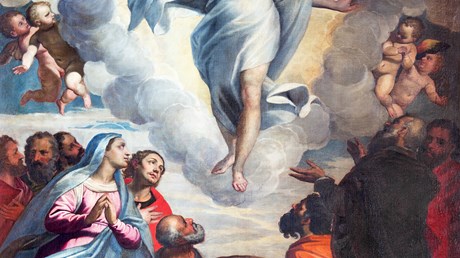Jesus’ Ascension seems to happen at a rather inopportune time.

For those following a liturgical church calendar, Pentecost is generally viewed as the climactic moment of Eastertide. In Acts 2, the Holy Spirit came with stunning fanfare on the little band of believers huddled down praying in that Upper Room. The commotion drew the attention of locals, and in one day, three thousand people came to believe in Jesus. But though Pentecost puts an exclamation point on the preceding 50 days in the Christian calendar, Ascension Sunday provides us needed reflection without which Pentecost doesn't make much sense.
Acts 2 loses a lot of its meaning without Acts 1.
The first chapter of Acts records the last face-to-face conversation the disciples had with Jesus. They asked him a crucial question in Acts 1:6, “Lord, are you at this time going to restore the kingdom to Israel?” It’s a question we ask still today as we work to reconcile our current experiences with what we believe God has done in the past and will be doing in the future.
Before the crucifixion, these same disciples had not understood Jesus’ coming death and resurrection. Along the Emmaus road after his resurrection, he connected for them the dots between the Old Testament and his death (Luke 24:13–27). It makes sense then that these same disciples wanted a little more clarity about the next steps after his resurrection. It makes sense that at times we still do as well.
But Jesus didn't explain the details to them in Acts 1. Instead, in the next verses, he promised once again the coming of the Holy Spirit, who would equip them to be his witnesses to “Jerusalem, in all Judea and Samaria, and to the ends of the earth.” Instead of explaining the details of what happened next, Jesus used language …
Source: Christianity Today Most Read